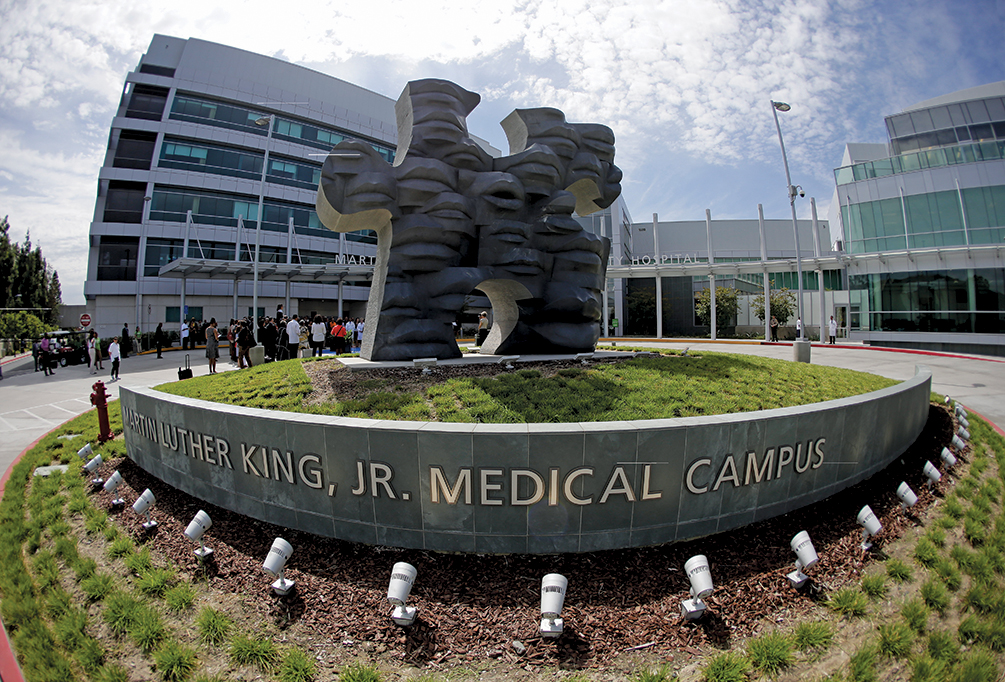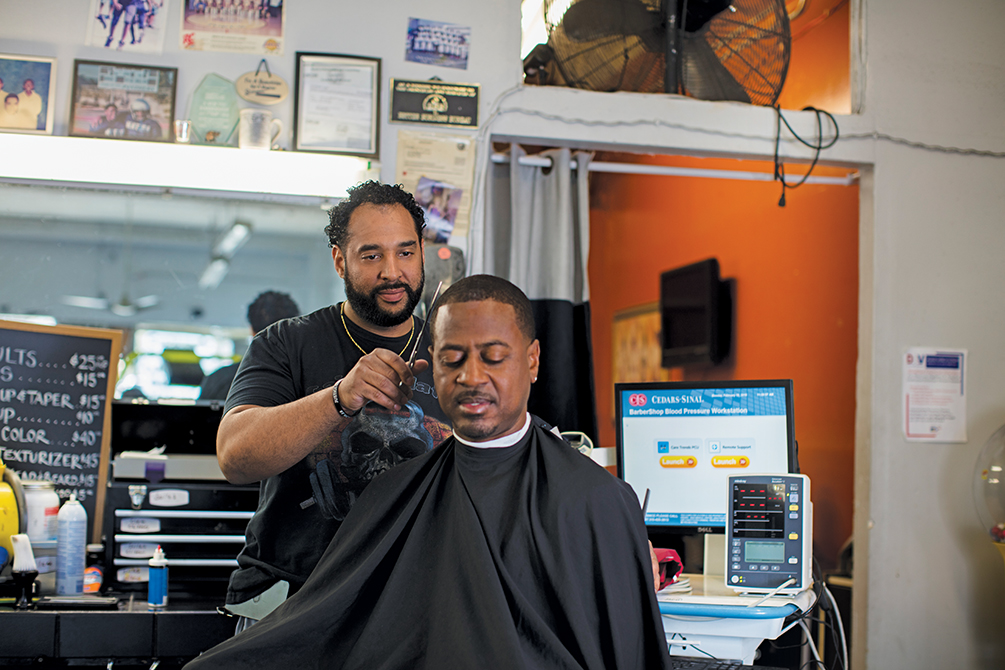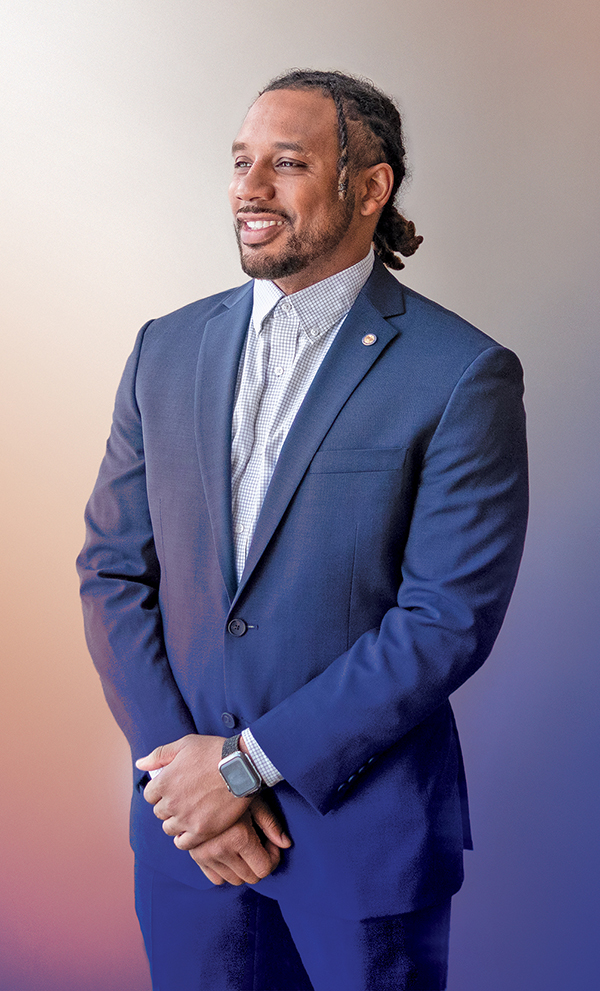From LA to Ann Arbor, in pursuit of leadership

Davontae Nathaniel Foxx-Drew’s lived experience sparked his passion for healthcare, his pursuit of leadership
By Matt Markey
Davontae Nathaniel Foxx-Drew walked into a healthcare seminar in early 2011 as a college freshman, uncertain about his career path or where his education might take him.
While at the University of California, Los Angeles (UCLA), he was majoring in African American studies with a minor in Anthropology, but his compass had not yet settled on a heading.
While many of his contemporaries were in pre-med, Foxx-Drew, raised by his mother, a registered nurse, was oriented more toward public health.
He had learned a lot about healthcare disparities across the country and was troubled by what he saw as glaring shortcomings in healthcare delivery in his hometown of Compton, which is part of the Los Angeles metroplex.
While attending a healthcare seminar, Foxx-Drew found out that the only public community hospital in Compton, the Martin Luther King Jr. Community Hospital, closed in 2007. This shocking revelation provided clarity and ignited his ambition to pursue healthcare.

“I was shocked, thinking, wow, how does something like this happen? They were essentially taking healthcare right out of my neighborhood, where there was a high prevalence of poor health outcomes,” Foxx-Drew said. “I decided right then to focus on public health with a goal of reopening that hospital. I didn’t know how—it was very ambitious—but I was determined to see that place open again.”
Foxx-Drew’s lived experience and exposure to obstacles affecting low-income communities sparked his passion for healthcare and his pursuit of leadership.
During his time at the University of Michigan, where he is pursuing a Master of Health Services Administration (MHSA) from the School of Public Health in the Department of Health Management and Policy, and an MBA from the Ross School of Business, Foxx-Drew has demonstrated the academic skills and leadership qualities that likely will land him a prominent and impactful position in the healthcare industry.
I was impressed from the start. His candid and straightforward personality was immediately engaging. His personal story and approach to graduate school clued me in to his future success. He is constantly involved in student activities, community service and family support.”
— Ebbin Dotson
Ebbin Dotson, assistant professor of Health Management and Policy at Michigan Public Health, saw those attributes when he interviewed Foxx-Drew for admission into the master’s program.
“I was impressed from the start,” Dotson said. “His candid and straightforward personality was immediately engaging. His personal story and approach to graduate school clued me in to his future success. He is constantly involved in student activities, community service and family support.”
Foxx-Drew serves as vice president of the Public Health Student Assembly (PHSA) and previously held positions as a class representative for the Health Management and Policy Department and Health Management and Policy chair for PHSA.
But his route to the University of Michigan and landing those roles was a circuitous one.
“When I finished my undergrad at UCLA in 2015, I decided to apply to graduate schools since that was the next logical step,” he said, “and so many hospital administrators I knew of had gone to U-M. I applied to several places, but Michigan was always my No. 1 choice.”
However, following the news that he was not admitted into any of the graduate schools to which he had applied in 2015, he began working on enhancing his academic and professional profiles.
“I was super bummed out, but you keep working and pushing forward,” Foxx-Drew said. “In many ways, this was a blessing in disguise. God’s plan for my life has led me to where I am today.”
He first took on a role with Teach For America, a nonprofit that focuses on developing tomorrow’s leaders. Foxx-Drew then filled a clinical research position at Cedars-Sinai Medical Center in Los Angeles.

He led an innovative program that connected older African American men with healthcare services, using Black barbershops as the intervention sites. He recruited 52 barbershops to participate in a blood pressure reduction study funded by the National Institutes of Health (NIH).
Foxx-Drew directed the marketing effort that brought 319 participants into the study and also managed and trained a dozen field staff employees to monitor safety and compliance in the program.
“I got hired to drive results that would improve the program, and within the first six months, we doubled our numbers,” he said. “I enjoyed the work, and one of my mentors, Dr. Ronald Victor, pushed me to study to be a doctor. I just felt that wasn't the right path for me, but the experience would give me the confidence to apply for grad school again someday.”
From there, his next stop on the career highway took Foxx-Drew to the San Francisco Bay Area, where he worked on the Mission Bit program—an outreach enterprise that seeks to bridge the technical gap that exists in many communities of color by encouraging youth to experience the realm of STEM through computer science projects.
As a leader, I’ve had the opportunity to engage deeply with classmates who have fewer lived experiences than I do. I am able to share my story and serve as a mentor.”
— Davontae Nathaniel Foxx-Drew
Foxx-Drew then took on an opportunity at the University of California Office of the President (UCOP) in downtown Oakland, where he participated in the Human Resources Strategy rotational program, further enhancing his professional experience.
“I thought it was important to learn how HR strategy works and how business strategy is structured around it,” he said. “I was excited to work there and learn about how the compensation system works, how the relationship with labor unions works, and about labor negotiations. There are many key things in HR strategy that anyone in a healthcare leadership role should be familiar with.”
Foxx-Drew eventually moved into a Systemwide HR Project Analyst role with the UCOP, a position he remains connected with on a remote basis today. He has directed a team of consultants working on a standardized change management practice, developed a leadership alignment approach and employee communication plan and put together an extensive cost-benefit analysis to implement salary structure adjustments throughout the UC system.
“I learned a tremendous amount and made some great connections, including within the UC healthcare system, but once the pandemic hit I decided I needed to apply to grad school again,” he said. “I was 28 years old, and it was time.”
Foxx-Drew applied to Michigan; UCLA; Johns Hopkins University; the University of Southern California; University of California, Berkeley; and Columbia University. This time, he was accepted by all six graduate programs.

“At that point, I talked with Dr. Charles Alexander, who had been my professor and mentor at UCLA, and he said, ‘Go to Michigan.’ I had made so many connections in healthcare who attended Michigan for grad school. So, it was only right that I did the same.”
Alexander, associate vice provost for student diversity at UCLA, said Michigan gained a future rock star in the healthcare world.
“He is smart, resourceful, and has a strong interest in the health and well-being of marginalized communities,” Alexander said of his former student. “I expect great things from Davontae and look forward to him being a leader in the public health profession one day.”
Foxx-Drew, who is being supported by the Dana Jones Walker and Willard H. Johnson Scholarship funds, said having a lot of stamps on his education and work experience passport before he reached Ann Arbor has been very positive. He also was attracted to the opportunity at Michigan to follow a dual-degree track.
“My focus has been on healthcare, but my classes at Ross are strengthening my business acumen in communication, leadership and management,” he said. “You need many skills to run a health system, so my Ross MBA complements what I am learning at the School of Public Health in the Health Management and Policy program.”
Foxx-Drew said Dotson has helped him navigate the demands of the dual curriculum.
“He’s been a sounding board when I need to figure things out,” Foxx-Drew said. “Dr. Dotson has been very influential on a lot of things. He is a big part of the reason I came to U-M in the first place.”
Foxx-Drew said he was very involved in student leadership as an undergraduate student at UCLA, and is comfortable in that role on the Ann Arbor campus.
“As a leader, I’ve had the opportunity to engage deeply with classmates who have fewer lived experiences than I do,” he said. “I am able to share my story and serve as a mentor.”
Foxx-Drew said he sees unlimited opportunities in the healthcare field, adding the need for quality care will not subside.
“There will always be people who require quality healthcare services, but I hope to play a role in reaching people before their health gets to that point, because the more prevention you can do, the better health outcomes people may experience,” he said. “I think I’ll be comfortable leading a healthcare system since—through my experience—I’ve grown comfortable being the face of something important. I’m comfortable leading, so I want to learn the intangibles and become a refined leader.”
Dotson said he is grateful for the opportunity to serve as a faculty member of color and an advisor to Foxx-Drew, who he sees playing a major role in the healthcare field.
“I value his perspectives and commitment to solving our healthcare issues,” Dotson said. “Healthcare needs Mr. Foxx-Drew. His measure of health, management and policy and business training will serve us all well in the near and distant future.”
As for that hospital in Compton that Foxx-Drew was so passionate about reopening? The hospital was reopened in 2015 by Los Angeles County. He is pleased that his home community is being served again.
“It’s in good hands, but I still want to run that hospital someday—that is my goal,” Foxx-Drew said. “Following graduate school, I see myself working in a healthcare consulting role to gain significant experience on various projects and working with people in the positions I see myself in, solving complex healthcare problems. To be a great leader, you must work with great people and learn how they think, which is what I intend to do.”
- Interested in public health? Learn more here.
- Read 'Larry Brilliant: A lifelong pursuit of public health' in this issue of Findings.
- Support research and engaged learning at the School of Public Health.
